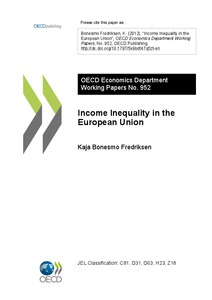Income inequality in the European Union
"Poor growth performance over the past decades in Europe has increased concerns for rising income dispersion and social exclusion. European authorities have recently launched the Europe 2020 strategy which aims to improve social inclusion in Europe on top of already existing European regional p...
| Main Author: | |
|---|---|
| Institution: | ETUI-European Trade Union Institute |
| Format: | TEXT |
| Language: | English |
| Published: |
Paris
2012
OECD |
| Subjects: | |
| Online Access: | https://www.labourline.org/KENTIKA-19134421124919526039-income-inequality-in-the-europ.htm |
| Summary: | "Poor growth performance over the past decades in Europe has increased concerns for rising income dispersion and social exclusion. European authorities have recently launched the Europe 2020 strategy which aims to improve social inclusion in Europe on top of already existing European regional policies aiming to reduce regional disparities through stimulating growth in areas where incomes are relatively low. While it is most common to confine measures of inequality to national borders, the existence of such union-wide objectives and policies motivates measuring income dispersion among all Europeans in this paper. Towards the end of the 2000s the income distribution in Europe was more unequal than in the average OECD country, albeit notably less so than in the United States. It is the within-country, not the between-country dimension, which appears to be most important. Inequality in Europe has risen quite substantially since the mid 1980s. While the EU enlargement process has contributed to this, it is not the only explanation since inequality has also increased within a "core" of 8 European countries. Large income gains among the 10% top earners appear to be a main driver behind this evolution." |
|---|---|
| Physical Description: | 25 p. Digital |

